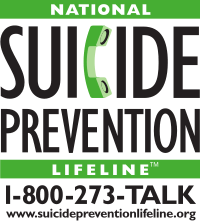National Suicide Prevention Lifeline
 Logo of the National Suicide Prevention Lifeline | |
| Formation | December 6, 2004[1][2] |
|---|---|
| Purpose | Suicide prevention |
| Headquarters | 50 Broadway, New York City, New York, U.S. 10004 |
Region | Nationwide |
Official language | English; Spanish also available on the hotline |
Key people | Dr. John Draper |
Volunteers (2014) | 150 |
| Website |
suicidepreventionlifeline |
The National Suicide Prevention Lifeline (1-800-273-TALK [8255]) is a United States-based suicide prevention network of 161 crisis centers that provides a 24/7, toll-free hotline available to anyone in suicidal crisis or emotional distress. After dialling 1-800-273-TALK (8255), the caller is routed to their nearest crisis center to receive immediate counseling and local mental health referrals. The Lifeline supports people who call for themselves or someone they care about.
History
The National Suicide Prevention Lifeline grant is one component of the National Suicide Prevention Initiative (NSPI), a multi-project effort to reduce suicide, led by the Substance Abuse and Mental Health Services Administration’s (SAMHSA) Center for Mental Health Services.[3]
In July 2004, SAMHSA released a notice of funding availability (NOFA) as part of its National Suicide Prevention Initiative (NSPI). In keeping with SAMHSA's duty to advance the goals of the National Strategy for Suicide Prevention, the NOFA called for proposals from nonprofit organizations to expand, enhance, and sustain a network of certified crisis centers providing suicide prevention and intervention services to those in need using a toll-free number and website.
In September 2004, the Mental Health Association of New York City (MHA-NYC) was selected to administer the federally funded network of crisis centers named the National Suicide Prevention Lifeline.[4]
In December 2004, the National Suicide Prevention Lifeline was founded by the Substance Abuse and Mental Health Services Administration, a division of the Department of Health and Human Services.
Google, Bing, Yahoo and Ask.com all place the phone number and website details of the National Suicide Prevention Lifeline as the reserved first result for when one enters keywords related to suicide, such as "How to tie a noose" and "I want to die."
In April 2017, the musician and Hip Hop artist Logic released a song featuring Alessia Cara and Khalid for his third album Everybody titled “1-800-273-8255”, the number used for The National Suicide Prevention Hotline. On the day of the song release, the lifeline received one of its highest daily call volumes.[5] It was made to bring awareness to the hotline and to the problems associated with suicide. After being featured on the 2017 MTV Video Music Awards, it increased the calls to the hotline by 50% that night. On the day of the song release, "Lifeline's Facebook page saw 3 times its usual traffic" and Lifeline's "website saw a 17% increase in users in May 2017 over the previous month."[5] Many of the callers to several crisis centers have mentioned Logic's song, and a third of those callers were struggling with suicidal thoughts.[5]
VA partnership
In June 2007, the Department of Veterans Affairs (VA) partnered with SAMHSA and the National Suicide Prevention Lifeline to provide a veterans hotline to help vets in emotional crisis. Veterans who indicate that they are a U.S. military veteran by pressing one after dialing 1-800-273-TALK, are routed to the Veterans Hotline. This service caters to veteran-specific mental health care needs and helps connect vets to the VA Healthcare system.[6]
See also
References
- ↑ "SuicidePreventionLifeline.org WHOIS, DNS, & Domain Info - DomainTools". WHOIS. Retrieved 2016-12-05.
- ↑ "What They Didn't Teach at the Academy: Topics, Stories, and Reality beyond... - Google Books". Google Books. 2014. Retrieved 2016-12-05.
- ↑ CMHS Programs: National Suicide Prevention Initiative
- ↑ "Lonely? Trapped? Hopeless? Alone? When it seems like there is no hope, there is help."
- 1 2 3 "Logic Tweets National Suicide Prevention Lifeline Statistics Since His '1-800' Release". Billboard. Retrieved 2017-12-04.
- ↑ Mental Health Home